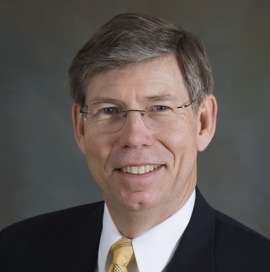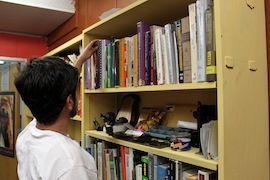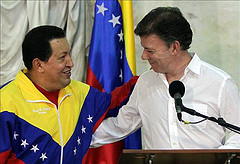
Latin America: Week in Review, United States
Florida Attorney General Proposes Arizona-Style Immigration Law; Immigration May Play Key Role In Upcoming Elections
August 12, 2010 By Staff

Florida Attorney General Bill McCollum.
Today in Latin America
Top Story — As the federal government and the state of Arizona continue to clash over a controversial immigration law, Florida legislators have begun discussing an even stricter measure.
Florida attorney general and candidate for governor Bill McCollum proposed legislation on Wednesday that would require police to check the immigration status of the people they stop while enforcing other laws, The BBC reports.
“I support the Arizona immigration law,” McCollum said at a press conference, according to The Palm Beach Post. “But this is our law, not their law. Arizona is going to want our law.”
Florida law currently permits checking the immigration status of those stopped by the police, but does not require it.
The proposal comes less than two weeks after Senator Lindsay Graham (R-SC) told Fox News he favored reconsidering the 14th amendment, which guarantees citizenship to those born within the country, as a way to discourage illegal immigration.
McCollum’s proposal promises to cause controversy in Florida as it heads into November elections. Florida’s population was 21 percent Hispanic in 2008, according to the Pew Hispanic Center.
Florida’s center-right governor, Charlie Crist, told CNN’s Wolf Blitzer on Wednesday that he opposed McCollum’s approach, likening it to the Arizona law.
“I don’t like the Arizona law, I don’t think it’s the way to go,” Crist said, according to The Orlando Sentinel. “And I think the key word that came out during your introduction was people that are suspected of being illegal immigrants. Well, how do you make that determination? By what they look like? I mean, that’s not part of the America that I believe in.”
Crist is running for a senate seat against Cuban-American conservative and tea party favorite Marco Rubio, who has shown mixed signals toward adopting an Arizona-style approach to the problem of illegal immigration.
Rubio originally opposed the law, saying in late April that “the law has potential unintended consequences, and it’s one of the reasons why I think immigration needs to be a federal issue, not a state one.” But Rubio changed his position in early May, following changes to the law to address concerns about racial profiling.
Other Top News: Paraguayan President Fernando Lugo will undergo six chemotherapy sessions beginning Thursday to treat a recently diagnosed, non-Hodgkins lymphoma of low malignancy, The Associated Press reports.
Just Published at the Latin America News Dispatch
- Alison Bowen discusses the Arizona immigration law’s ripple effects in the latest post to her blog Beyond Borders.
Headlines from the Western Hemisphere
North America
- The U.S. Senate will vote Thursday on a $600 million measure to send more troops to the U.S.-Mexico border.
- Mexican President Felipe Calderón asked members of the Mexican judiciary Wednesday why so few people are being prosecuted for violent crimes.
Caribbean
- Finding a job is posing a major challenge for many Haitians since the Jan. 12 earthquake. Before the disaster, unemployment was estimated at 70% or higher. Reconstruction will help many, but projects are years away.
- A U.S.-backed textile training center opens in Haiti that aid agencies hope will help Haiti rebound from a devastating earthquake.
- The United Nations says its peacekeepers in Haiti have repaired a main bridge linking the country to the Dominican Republic.
- Police in Puerto Rico say a woman stabbed her 3-year-old daughter and 1-year-old son to death after arguing with her partner.
Central America
- Costa Rica’s Constitutional Court voted 5-2 to block a referendum that would have allowed Costa Ricans to vote on legalizing same-sex unions, saying that the protection of minority rights is a legislative and not an electoral matter.
- Fitch Ratings said Guatemala’s economy is stable despite the effects of the 2008 economic downturn and increasing political and social instability.
- La Chewrayka, Nicaragua, one of the biggest landfill sites in the Americas, is home to around 1,700 people.
Andes
- The renewal of ties between Colombia and Venezuela comes as a relief to many, not least to some five million people along both sides of the border badly hit by a massive drop in joint trade.
- Former Colombian President Alvaro Uribe is taking his political expertise to Georgetown University in Washington, where he has been named a distinguished scholar for the upcoming academic year.
- Venezuela remains opposed to Washington’s nominee for ambassador to Caracas, a top lawmaker said Wednesday, adding that if the U.S. refuses to pick an alternative candidate, it won’t have any representation at all.
- Peruvian protest leader Alberto Pizango, who is facing rebellion charges stemming from deadly clashes last year, announced Wednesday that Amazonian Indians are looking to form their own political party, and he may be its presidential candidate.
- A former Venezuelan army general who has denounced growing involvement by Cuban troops in President Hugo Chavez’s military appeared before prosecutors Wednesday to respond to charges of insulting the armed forces and revealing military secrets.
Southern Cone
- Brazilian President Lula da Silva signed a decree saying he would back United Nations sanctions against Iran, a week after Iran rejected his offer of asylum to an Iranian woman sentenced to death by stoning.
- Chilean President Sebastián Piñera fired three of the country’s top mining officials as hopes of rescuing 33 miners trapped in northern Chile grow dimmer with each day.
- Argentina’s foreign minister met with Secretary of State Hillary Clinton in Washington D.C. to discuss U.S.-Argentine relations.
- Seven foreign-flagged ships in the port of Montevideo have been seized after fishermen on board issued a series of labor demands, threatening to stall shipping traffic to Uruguay’s capital.
Image: Public Domain.




